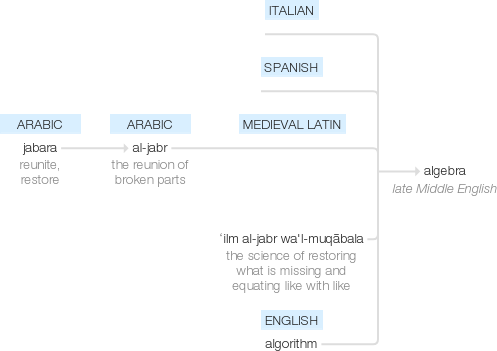Algebra
late Middle English: from Italian, Spanish, and medieval Latin, from Arabic al-jabr ‘the reunion of broken parts’, ‘bone-setting’, from jabara ‘reunite, restore’. The original sense, ‘the surgical treatment of fractures’, probably came via Spanish, in which it survives; the mathematical sense comes from the title of a book, ‘ilm al-jabr wa'l-muqābala ‘the science of restoring what is missing and equating like with like’, by the mathematician al-Ḵwārizmī (see algorithm).
wiktionary
From Medieval Latin algebrāica, from Arabic word الْجَبْر (al-jabr, “reunion, resetting of broken parts”) in the title of al-Khwarizmi's influential work الْكِتَاب الْمُخْتَصَر فِي حِسَاب الْجَبْر وَالْمُقَابَلَة(al-kitāb al-muḵtaṣar fī ḥisāb al-jabr wa-l-muqābala, “The Compendious Book on Calculation by Completion and Balancing”).
etymonline
algebra (n.)
"formal mathematics; the analysis of equations; the art of reasoning about quantitative relations by the aid of a compact and highly systematized notation," 1550s, from Medieval Latin algebra, from Arabic "al-mukhtasar fi hisab al-jabr wa al-muqabala" ("the compendium on calculation by restoring and balancing"), the title of the famous 9c. treatise on equations by Baghdad mathematician Abu Ja'far Muhammad ibn Musa al-Khwarizmi. Arabic al jabr ("in vulgar pronunciation, al-jebr" [Klein]) "reunion of broken parts" (reducing fractions to integers in computation) was one of the two preparatory steps to solving algebraic equations; it is from Arabic jabara "reintegrate, reunite, consolidate." Al-Khwarizmi's book (translated into Latin in 12c.) also introduced Arabic numerals to the West. John Dee (16c.) calls it algiebar and almachabel. The accent shifted 17c. from second syllable to first.
The same word was used in English 15c.-16c. to mean "bone-setting," as was Medieval Latin algebra, a usage picked up probably from Arab medical men in Spain.
